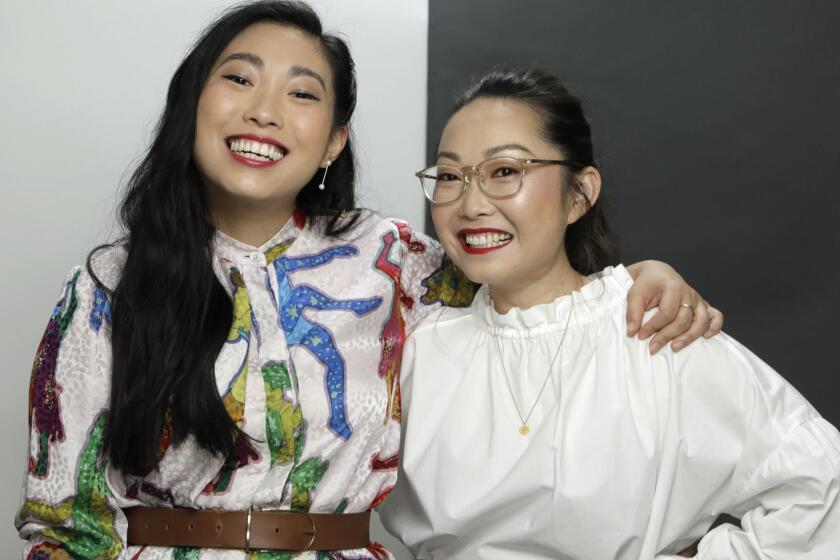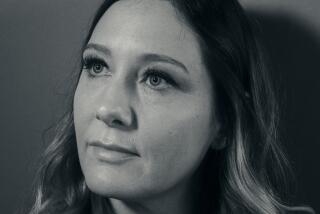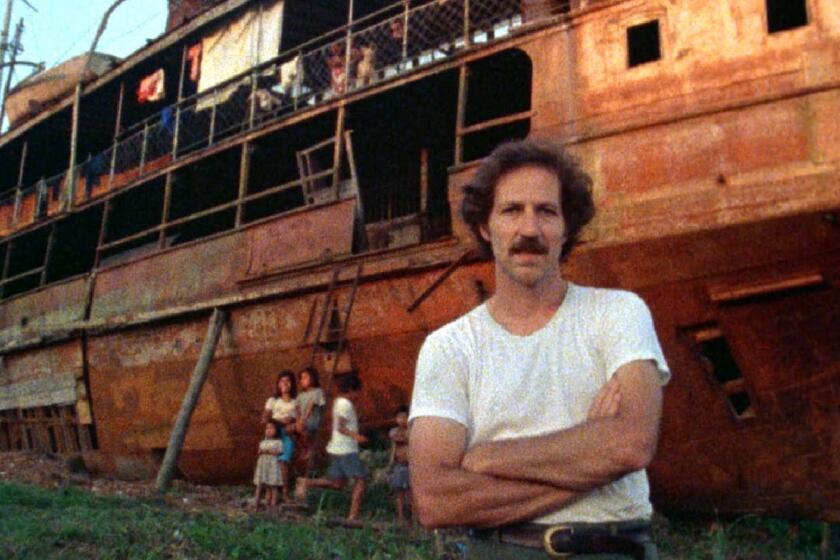The ‘Farewell’ audition moment that turned Awkwafina from comedy star to Oscar contender
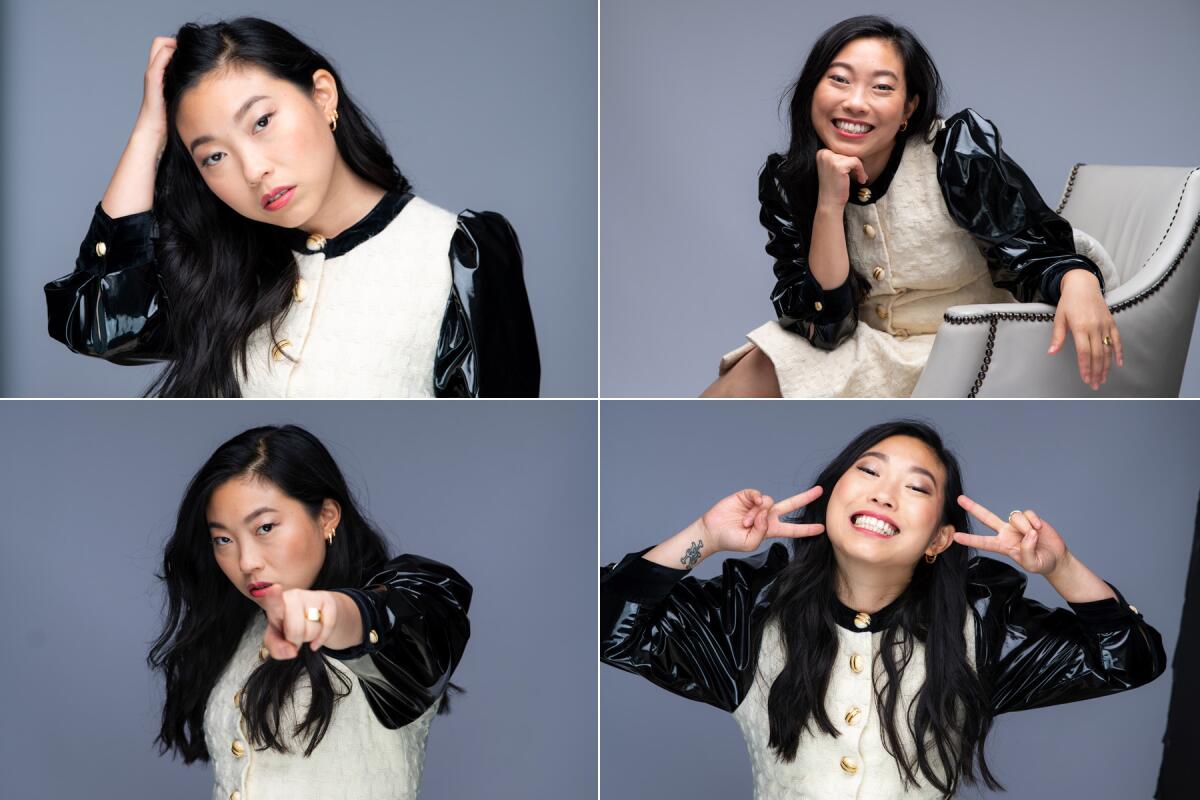
Awkwafina is not herself. She’s also not her “The Farewell” writer-director, Lulu Wang. Truth to tell, she’s not even Awkwafina.
“Hi,” she says, warmly, greeting a guest though fighting flu-like symptoms. “I’m Nora.”
Indeed she is: Born Nora Lum in New York City 30 years ago, now better known as Awkwafina, ribald rapping sensation on the internet and skyrocketing comic actress. She has a show in the works at Comedy Central, “Awkafina Is Nora From Queens.” Her hip-hop paean to her female anatomy has more than 4.7 million views on YouTube. Two of her recent films — “Crazy Rich Asians” and “Ocean’s 8” — combined for over $530 million in grosses. Soon, she’ll appear in “Jumanji: The Next Level” and join the Marvel Cinematic Universe in “Shang-Chi and the Legend of the Ten Rings” (due in 2021).
And she was recently surprised to find the New York Botanical Gardens had named an orchid for her: Vanda Awkwafina.
“It was crazier than you’d think because the people that did it had no idea my history with the botanical garden,” she says in her trademark rasp — sort of a slier and nastier Brenda Vaccaro (though a bit subdued today, due to that illness).
Over breakfast on a recent morning in Beverly Hills, Awkwafina proudly estimated that 80% of the people she’s met at screenings of her latest film, “The Farewell,” have come up to her misty-eyed.
“My dad cried, my grandma cried. ... When my mom found out she was dying, we would go out to the garden. There was a church across the street. She would go into the church and we would wait outside and sometimes we’d hear her crying. Really just completely throwing it all out. Then after that, she’d sit in the garden with us and just — peace. All that stuff that she had, she buried it there. So when that orchid came, it meant a lot.”
Lum was only 4 when her mother died. She was raised by her grandmother, whom she calls her “best friend.” Now, the actress is collecting rave reviews for her sensitive turn in the late-summer A24 drama “The Farewell.” She plays the American outsider, Billi, who must face her Chinese grandmother’s terminal cancer diagnosis, complicated by the family’s choice to not tell the matriarch of her condition, per tradition. Navigating an all but alien culture in Changchun, China, is a not particularly veiled version of Wang, in an absurd and emotional chapter from the filmmaker’s real life.
The Times’ Justin Chang wrote of Awkwafina in his review, “She’s superb here in her first dramatic leading role, using her deadpan comic instincts to underscore the wryness of Billi’s worldview.” “The Farewell” holds a 99% positive score on Rotten Tomatoes, with a sterling 8.58 (out of 10) average review. It’s one of the most acclaimed films of the year so far, with Awkwafina front and center.
It’s a ride the actress deems unlikely: “I don’t look like a movie star. I don’t act like one, I don’t sound like one. I’m a frumpy, slouchy, big mouth. Not what you’d imagine.”
Separately, Wang says that though the actress was distinctly unlike her, Awkwafina became her intended doppelgänger, Billi. Or vice versa.
“I’m very American, but I speak Chinese a lot better than Nora,” says the writer-director. “But the fact that Nora’s Chinese is so much worse than mine actually supported the character because she is so American. She’s such a New Yorker. Even her body posture, the way that she slouches. I’d tap her and say, ‘Sit up straight!’ We’d do a couple of takes and then she’d get back into that position again. So finally, I said, ‘You know, I think that’s just the character.’
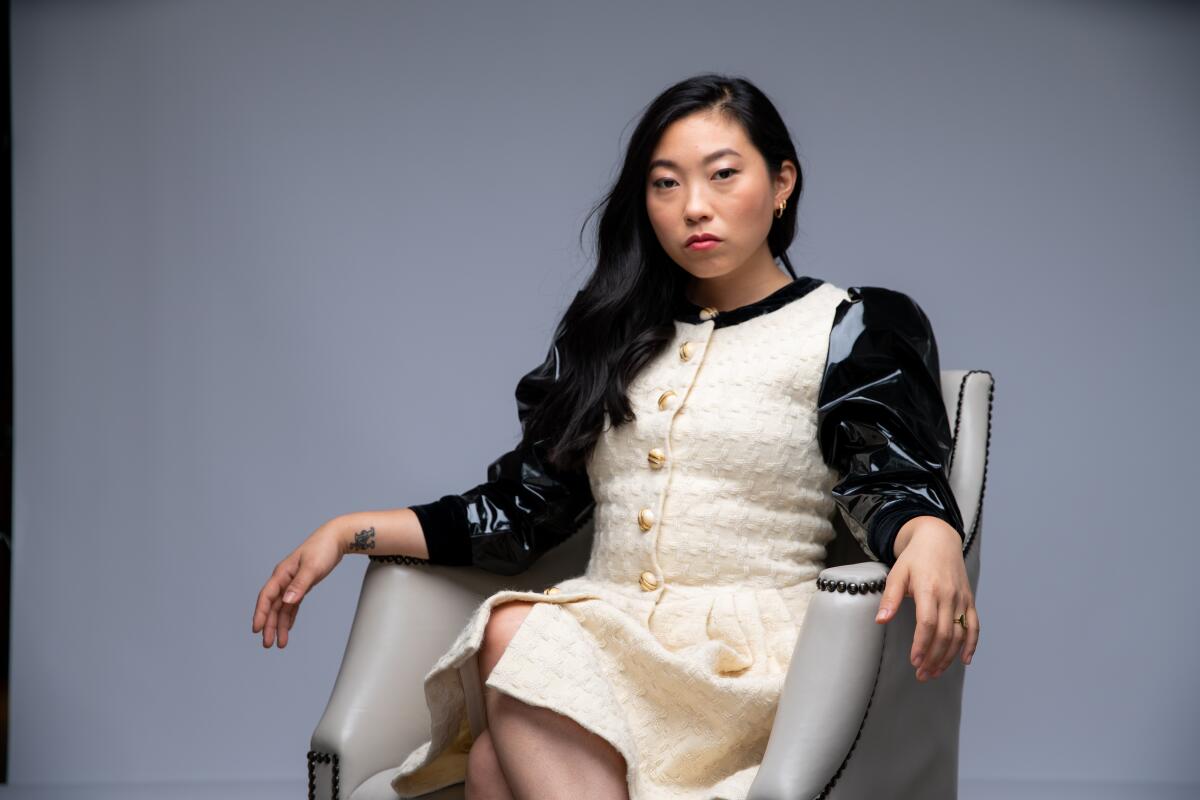
“We shot the New York stuff later. I wanted to show she’s not this awkward, hunched-up person. In New York, she’s very funny, open, very strong and independent. So the way she makes herself smaller in China works because it’s a result of her not having agency, not being allowed to talk. That was something Nora brought instinctively.”
Wang pauses and adds, “I definitely do not slouch like that,” and laughs.
Awkwafina describes herself as “new to acting,” but she had the advantage of connecting deeply with Wang’s script.
“It was a very intense experience for me. I cried every night because I thought about my grandma. It was a full body-and-mind experience. It transformed me, for sure,” says the actress.
“When it came to my grandmother, what I really related to was the goofiness, that relationship we have — both in the movie and in real life. Half of the conversations I have with my grandma are just cracking up. I think when you’re getting ready to lose a loved one, it’s those moments of joy you really, really cherish.”
Wang notes that the actress had a breakthrough once she let go of her comedic urges: “Nora told me if things were tense in her family, or whatever, she would just crack a joke and that would lighten up the atmosphere and that became her superpower. So she was always cracking jokes with the crew as soon as we cut. Then she kept saying, ‘I don’t know if I’m going to be able to cry. Some of the places Billi needs to go, I don’t know if I can go there.’
“I said, instead of dissipating the tension she feels, that Nora feels, she should channel those feelings of loss, of pain, and hold on to it. Not try to crack a joke, not try to alleviate the tension. Once she realized that, it really brought her performance to another level. She could just sit in silence and carry the weight of the things she was feeling, and you could see it in her eyes.”
Awkwafina agrees: “In my normal life, I like to keep things light. When my mother passed, that was how I dealt with it: ‘I don’t want you to cry right now; I want you to laugh. I don’t want to be someone you feel bad for.’ So I carry that with me into my adult life to prevent myself from being vulnerable.
Even though I hadn’t done drama, there was something in me that tapped into that. It tapped into my experience with loss.
— Awkwafina
“So for ‘The Farewell,’ I had to be present. And when you’re present, you absorb so much more of what’s going on. Those roles where you lose weight, put on an accent, I don’t know if I’d be good at stuff like that. There are actors that can play anybody. But there was a weird connection to this role. Even though I hadn’t done drama, there was something in me that tapped into that. It tapped into my experience with loss.”
The actress knew to try to win such a demanding role without the dramatic (and Mandarin) bona fides would be audacious.
“I wanted to impress Lulu. I think Lulu said she didn’t want to hire me. In one place, she called me an ‘influencer’; she didn’t want to hire an influencer. I was like, ‘OK …’
“But she saw the self-tape. I didn’t think I was gonna get it but I think she saw that connection.”
Wang says of that audition, “She had a rawness about her. It didn’t feel like she was playing a role. I could feel the love she has for her grandmother and the pain of not understanding her grandmother’s culture as well as she would like to, and the pain of knowing she’s going to lose her grandma sometime in the near future. You could see all of that in the audition, in the silences.
“So often actors, they’re not really listening. You can almost see they’re just waiting for their turn to talk. For Billi, so much of the movie has to be carried by the actress in silence, I needed somebody who could do silence really well and convey emotions through their face. Nora was just brilliant at that. It was like a storm was passing on her face.”
Awkwafina’s real grandmother, though, took some time to fully respond to the film. The actress brought a screener over but her grandmother didn’t seem to pay very close attention — toward the end, she even got up to make dinner. Finally, she said she’d see it in the theater, “because she was sick of being nagged about it.” So she saw it, and it was waterworks.
“My grandma loved it. She was moved. She told me it had happened to her. It’s not a weird custom to her. It was cool to show her a movie I was in that she could relate to.”
But the emotional reactions weren’t limited to Awkwafina’s family: “A friend showed me this video on YouTube of people reacting to trailers. One of them was, like, a big Awkwafina fan and the other one didn’t know who I was. They weren’t Asian. They didn’t know what the movie was about, then they watched the trailer. There was this one girl who said, ‘I feel that.’ She had somebody in her family who had cancer. Through the whole thing, she couldn’t stop crying because it reminded her of her own experience.
“We’re all human. We all deal with loss. We all have to prepare for that. That’s why this is universal. When I read the script, I thought it was very specific to me, to my experience, but it’s not. It goes bigger than that.”

More to Read
Only good movies
Get the Indie Focus newsletter, Mark Olsen's weekly guide to the world of cinema.
You may occasionally receive promotional content from the Los Angeles Times.
